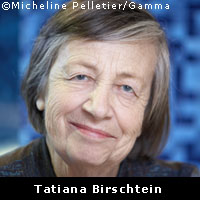Brussels honours top woman scientist
Representatives of the European Commission and the European Parliament were among those gathered in Brussels to honour Professor Tatiana Birshtein, the European winner of the 2007 L'Oreal UNESCO Awards 'For Women in Science', on 27 March. Professor Birshtein is based at the Institute of Macromolecular Compounds at the Russian Academy of Sciences in St Petersburg, where she works on the physics of polymers. She won her award 'for her contribution to the understanding of the shapes, sizes and motions of large molecules'. Born in Leningrad (now St Petersburg) in 1928, she has experienced not only gender issues, but war, religious intolerance and political upheaval during the course of her career. Despite all of this, her passion for science remains undimmed and at the event she spoke enthusiastically about her work, and underlined the importance of getting women into science. 'Women and men approach scientific problems differently,' she explained, noting that the best results came about when men and women worked together. Looking to the future, she pointed out that she has been involved in a number of European projects, and hopes to continue this collaboration under the Seventh Framework Programme (FP7). She is also busy organising an international symposium on polymers which will be held in her home city in 2008. The Brussels event was organised in the framework of the European Year of Equal Opportunities for All, and Viviane Reding, European Commissioner for Information Society and Media, highlighted the costs to the EU of wasting the skills and talents of women. Europe already has a shortfall of young, well qualified people and particularly of young qualified women. In Europe, 4% of graduates have a computing degree, while in the US and Korea the figures are 5% and 6% respectively. 'That, ladies and gentlemen, is quite a gap,' the Commissioner warned, pointing out that if research facilities and companies do not find enough staff in Europe, they will simply move elsewhere. Commissioner Reding described the winners of the L'Oreal-UNESCO awards as ambassadors, who could be role models for young women and girls interested in a career in science. Another speaker at the event was Polish MEP Jerzy Buzek, who steered the Seventh Framework Programme through its approval process in the European Parliament. He raised two issues which he sees as barriers to increasing the numbers of women in science. Firstly, there is a demographic problem. 'We don't just need more women in science, we also need more children,' he said. 'So how can we support women's re-entry into a scientific career after taking time out to look after children?' The second problem identified by Professor Buzek was a cultural one; he argued that from an early age, children should receive messages which break down cultural gender stereotypes. 'In books for primary school children, where it says 'this is a scientist', you should have a picture of a woman,' he suggested. 'And where it says 'this is a nurse', you should have a picture of a man.' Mr Maciej Nalecz of UNESCO welcomed the strong political support and interest in the awards shown by the Commission and Parliament, while Jean-Paul Agon of L'Oréal Europe welcomed the fact that the majority of EU Member States had set up award initiatives at national level.
Countries
Russia



